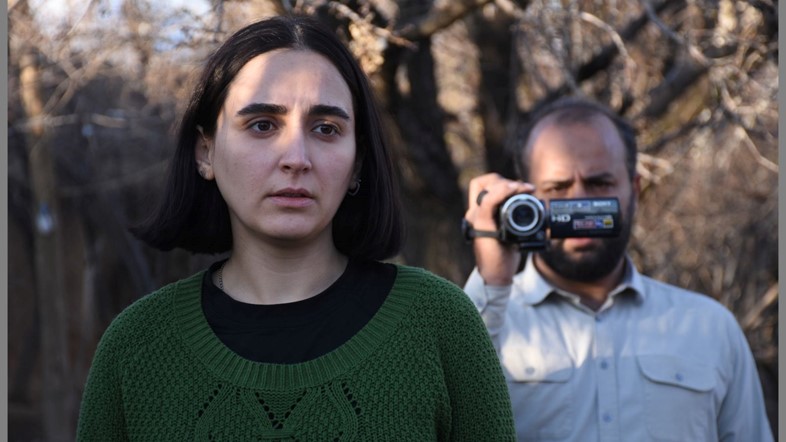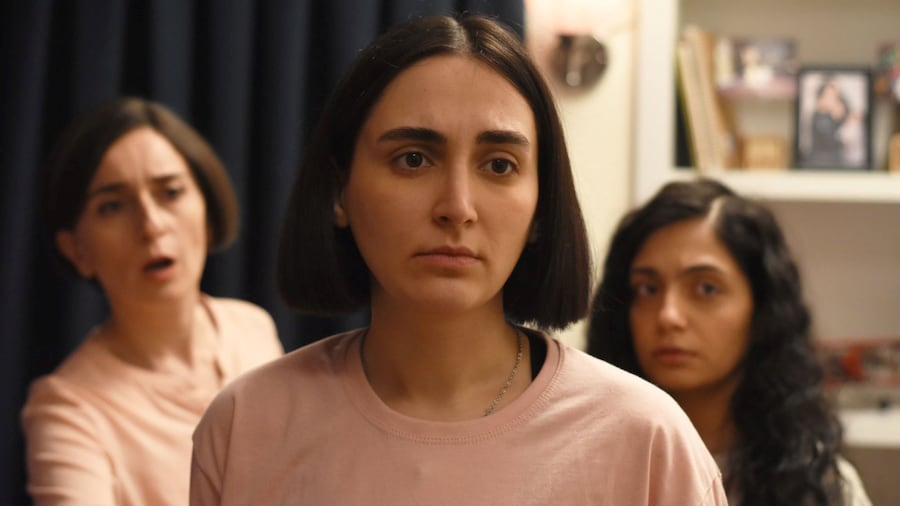Speaking from exile, director Mohammad Rasoulof talks about his granular portrait of the psychological and emotional realities of life during the Woman Life Freedom protests of 2022
In September 2022, when Mahsa Amini was killed in police custody and Woman Life Freedom protests erupted all over the streets of Iran, Mohammad Rasoulof was already in prison. It wasn’t the first time. His career had been marked by regular periods of interrogation, incarceration and punishment – vicious crackdowns from the Iranian regime in response to the political nature of his films and his outspoken criticism of the government – that had given him an intimate insight into the way the country’s judiciary system functioned, and the kind of people who worked in it. When he was temporarily released from prison in 2023, far from cowed, he channelled this insight into his latest endeavour, The Seed of the Sacred Fig, a film which follows a family during the Woman Life Freedom protests, whose father Iman works as an interrogator in the infamous Revolutionary Court.
The Seed of the Sacred Fig was filmed largely in secret, using falsified filming permits and with Rasoulof often sat directing from a distance to throw off the surveillance of the Iranian state. “There were several restrictions,” Rasoulof says about the film’s conditions – unique to most directors, by now secondhand to him. “[We worked] with a very small cast and crew, with very limited equipment – less than what most student films have at their disposal, in fact.” The resultant film is a small miracle made possible by the courage and creativity of its cast and crew, many of whom remain stuck and under investigation in Iran.
Rasoulof himself has since gone into exile, posting a video on his Instagram of his surreptitious crossing of the border to escape a fresh eight-year prison sentence for making The Seed of the Sacred Fig mere days before the film’s premiere at Cannes. His film’s thematic resonance with his own life is the natural continuation of many of Rasoulof’s career-long preoccupations: the relationship between individuals and systems, the granular mechanisms of power, the ongoing struggle for personal freedoms that mark so much of contemporary political life in Iran. In particular, Rasoulof was hugely inspired by a conversation he had with a prison guard during his 2022 imprisonment, which revealed the strange ambivalence and contradictions that mark the psychology of many of those working within the system. “He told me how upset he was about his job,” Rasoulof explains. “How much he’d come to hate himself, how criticised he was by his family. I thought that would be very interesting to work on such a family, and how such a big rift had come to be.”
This encounter encapsulates a question that has haunted Rasoulof through decades of his own legal troubles: how the Iranian regime had survived for almost 50 years in the face of so much dissent. “It’s always been a question for me how this system can keep going when everyone is so angry and unsatisfied about it,” he says. “During all these dealings I’ve had over the last 15 years with people working within the security and judiciary apparatus of the regime – prosecutors, judges, interrogators and so on – I was always wondering, what is it that enables them to accept being a cog within this machine of oppression.” The answer, he began to discover, pointed to a kind of symbiosis, that spoke as much to the psychology of individuals as to the mechanisms of power.
“What I tried to do in this film,” he explains, “is really show what I learned, which is that, on the one hand, you’ve got this repressive totalitarian system that works in its own way, and at the same time you’ve got certain individuals who have certain characteristics who become attracted to working in such a system. It’s almost as if one attracts the other.”

The Seed of the Sacred Fig is a film that is rooted deeply within traditional dramatic – and almost theatrical – frameworks; the killing of Mahsa Amini acts as a dramatic device that upsets the previous peace between the characters, while a gun given to Iman by his work looms over the film in a distinctly Chekovian fashion. Yet the film is also very much a product of contemporary Iranian society, offering a granular account of the psychological and emotional realities of life during the Woman Life Freedom protests, and the social shifts that started to take place between generations. This realism is compounded by Rasoulof’s use of real-life footage taken during the height of the protests, many of which had gone viral on social media. “Journalists are not allowed to operate freely in Iran – they cannot attend nor document nor report on protests,” he says. “So that makes it incumbent on protesters themselves, not only to be bodies on the street, but also to film through their own devices what are these terribly violent and impressive scenes of police violence against civilians. And so they have this great power, they are really moving.”
This emphasis on realism, and the film’s explicit critique of the Iranian state and contemporary sociopolitical events, sets it somewhat apart from a lot of Iranian cinema, which, even when critical, has had to speak through a language of metaphor and allegory to escape government crackdown. Rasoulof’s directness is a courageous act, but it also works as a reconfiguration of the language of Iranian cinema, and the possibilities of speaking back to censorship. “Metaphor certainly is one instrument of the language of art and it’s really important,” he says. “And yet, when it’s used in response to censorship, it can become one way of establishing or perhaps institutionalising censorship. Under the daily confrontation I have and have had with censorship, I chose to use a very direct language.” He pauses, and considers. “But I think the beauty of cinema actually relies in all these different languages and tools that are employed by filmmakers. Thank God we have a variety.”
The Seed of the Sacred Fig is out in UK cinemas now.
